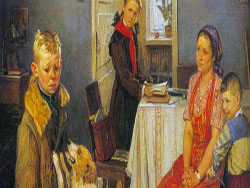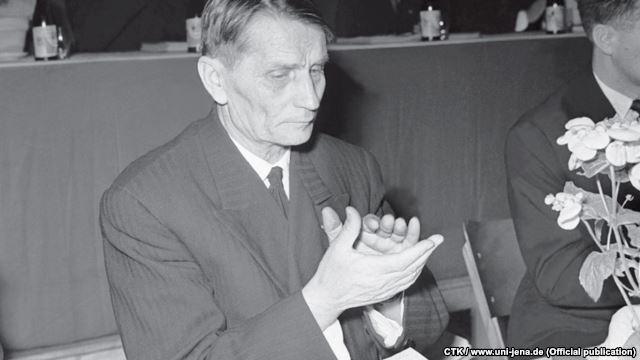
History in the Baltics – more than just a story. It is also a tool of manipulation and society marker to determine friend or foe. Whether, however, the story to be objective in our time and what is the role of this science in today’s Latvia, portal RuBaltic.Ru told of a famous Latvian historian, journalist and Director of several cultural and educational films Igor Gusev.
– Igor, not so long ago took Your creative meeting with readers under the motto “History: the palette of lies and the truth”. So what, in Your opinion, is the story?
– History is the science, protected the Greek goddess Clio, the mother is the goddess of memory Mnemosyne. In my opinion, it is the memory of the virtues of ancestors is an important part of history. In this regard I always remember the year 1871, ending the Franco-Prussian war and the brilliant victory of Prussia that initiated the formation of the German Empire. Then Chancellor Otto von Bismarck said that the war was won not soldiers on the battlefield. The war was won by German school teacher.
It is the teacher who has trained a generation of winners, ready to win in the name of the Fatherland. And above all, the history teacher!
The story should bring up in the soul of man proud of his ancestors, for his people, for his country. Yes, every nation has brilliant history, there are some that do not want to remember, so the history must be objective, honest. I am totally against distortion of history under the influence of momentary political conjuncture and that story is only praised or belittled. In my opinion, such extremes lead to the destruction of the nation. On the one hand, the unrestrained praise ageplay, on the other hand, the constant self-deprecation fosters an inferiority complex. Unfortunately, today we see that in Latvia there has come the period of complete denial of everything that reminds you of any ties of this territory with Russia. Selected the most negative and difficult moments of history. Yes, much was tragic, I admit. But it completely ignored or just not noticed the light and good that is connected with Russia, and this is a very dangerous path. Because Latvia lot of ties with its Eastern neighbor both politically and economically, and historically.
– To mention the fact that in Latvia in relation to Russia are selected only negative points: does it seem that lately it is not only Latvia, but a number of other countries, especially had close ties with Russia?
– Now Russia has become profitable to associate with many negative phenomena that occur in the modern world. The Russian accusation of all mortal sins – is a very simple scheme based on the elementary ignorance of history and outright lies. Because the story itself reminds us that, in addition to Russia, there is a considerable number of sinners, shyly Poselkovaya about their old and recent crimes.
There are also countries and peoples, which should always be grateful to the Russians simply for the fact of its existence on earth.
For example, Bulgaria, which Russia had freed from centuries of Ottoman domination, or the Georgians who in the eighteenth century was on the verge of physical extinction, as their lands with surprising regularity regularly frequented by Turkish and Persian invaders. But what should have been a couple of decades to do with the minds of young Bulgarians, if even in this country, where Russians have always considered brothers sconce carcasses, today a lush color nurtured the virus of Russophobia, despite the fact that all of Bulgaria is crammed with monuments to Russian-Bulgarian friendship, but this Pro-Western Bulgarian politicians prefer not to remember. In my opinion, this is a very bright example of professional reformatting of historical memory of an entire people.
– Can any history be objective, because at each change of power is changing and interpretation of various historical events?
– The story is not “may”, and just have to be objective. Because otherwise it ceases to be science and becomes merely a set of ideological cliches and stamps. The historian who has no conscience, inevitably sells his soul to the devil. As an honest researcher, a tremendous responsibility, because it affects the consciousness of the people, affects their Outlook, and hence – programmed by their deeds and actions. Imagine that you have come to the market and there you hung, cheated. Yes, sorry, of course, but it is the market, and you mentally prepared for what might happen. Now imagine that you come to Church, talking with the priest about Holy things, and in the evening accidentally bumped into him coming out of a strip club. Agree, it will be a slap in the face to your delicate feelings. When your dishonesty is showing a market trader, still can tolerate, but when God betrays the priest, it’s scary. After all, the man in charge of the souls of his flock, should be closer to the Lord and his commandments. Otherwise it’s deception, meanness…
The same historian. He presents the facts and gives them an explanation, and through the interpretation of the facts it affects the future of the country and the people. Behind all this is the highest degree of responsibility!
As an historian I may be wrong, can truly be mistaken, but I have no right to deceive! Yes, you can do without excessive savoring the bloody violence of the past is, you know, for everybody. Any fact can be presented to a greater or lesser degree of delicacy. Should be aware of the consequences, so as not to do evil, not rastravit old historical pain, not to inflate ceased was inter-ethnic enmity and hatred. Extra relish cruelty and past evil will not bring good to anyone. Yes, tragic pages of our history should not be forgotten to prevent a repetition in the future, but savoring them unnecessary, in my opinion, also detrimental. However, today in Latvia’s mass media literally implanted hatred to the events that were 60-70 or more years ago, this hatred is often transferred to us, Russian, now living here, making history in threatening political cudgel.
– Recently in Latvia has published a new book about Salaspils concentration camp, denying the atrocities and mass murders that were carried out by the Nazis during the war. In Your opinion, is this another lie or the desire to get to the truth?
– Salaspils camp – this is the most uncomfortable historical truth that does not fit into the official ideological interpretation of the Latvian past. Because it is based on a very primitive principle: until 1940 there was a wonderful, independent and prosperous Latvia, then here was the monstrous Soviet Union, just Mordor, and began a terrible “Russian occupation”. In 1941 came Hitler’s Germany – of course, also an occupation, but a softer, almost “fluffy”… In 1944, “Mordor” back in Latvia again Soviet power was established. So when it turns out that while “cultural and civilized” Germans of Latvian citizens died on the order more than at the hands of “Eastern barbarians”, it doesn’t fit in a neat and understandable even if the formal concept. Plus extremely uncomfortable facts about the voluntary participation of the Latvian executioners in mass killings of civilians… Uncomfortable, and therefore all much calmer and easier to declare “the Soviet falsifications” and “Communist propaganda.” Speaking about the authors of this customized and well-funded booklets: I’m sure they are well aware of their acts. They just can’t understand that all their conclusions are based only on a tenuous Foundation of today’s political situation. But alas, for some honor and conscience too, have their price money… Yes, it is possible to argue that, for example, in Buchenwald there was a crematorium, and therefore it can be considered a death camp, but at Salaspils such devices were not, and so the death camp he was not… But I believe that the thousands of people whom the Nazi hangmen put on cold Salaspilssky Sands, was not a great difference, to die from the gas Zyklon B or fall by the bullets of the SS guard.
– But for many people, exiled to Siberia after the war, the Soviet regime was indeed the “Mordor”, and they have their own historical truth, how about this?
– Yes, there were repressions, no one is arguing that. You know, the innocent have perished, many decent people who sincerely loved their country, faithfully serving her. However, I believe that it is impossible to indiscriminately transform the whole history of the Soviet Union only in the infinite relish of the Stalinist lawlessness. I always wondered how they showed Soviet reality in American cinema.
Look, think what a dark and gloomy horror! but as you look out the window – no, it feels good, barbed wire on the streets there, well-dressed girl walk, smile and eat ice cream. It was different, but let us in all fairness, speaking about the bad, to remember and good to talk about the bright, positive sides of Soviet life.
For example, according to statistics, from 1930 to 1940 in the USSR were built more than ten thousand large industrial facilities – plants, factories, silos, bridges and so on. Maybe we should study this experience, so that today we in Latvia opening of the plywood production on a hundred people of staff was not celebrated as an outstanding achievement of the Latvian industry. This is positive, is negative, and I support the idea of studying history, we study its multi-faceted and not snatching out of context something that we like, and trampling that does not fit into a particular design.
– Is it possible in the future in Latvia, such an objective approach to history, which You are promoting?
– I believe that in each person resides a deep moral sense, and sooner or later, as the return of a truly spiritual values in the lives of most people, this approach will prevail. It will be when morality will return to the story, because it is from the interpretation of the past dictate our future.








